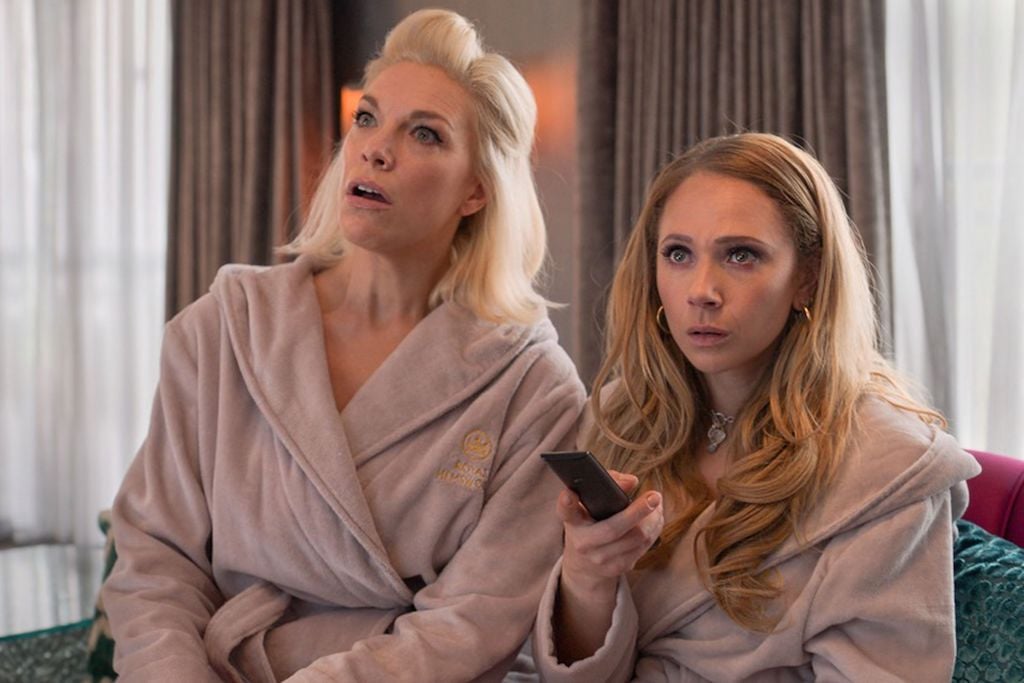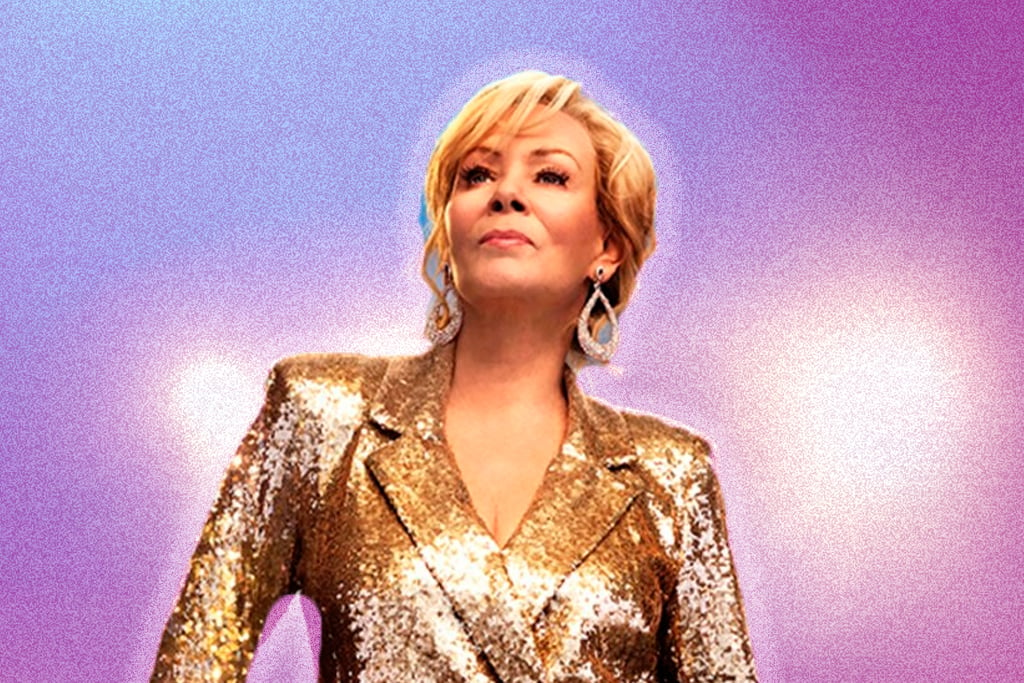Rebecca And Keeley’s Friendship Brings Another Unexpected Joy To ‘Ted Lasso’
Rebecca and Keeley's relationship isn't a shallow representation of female friendship, it's the real thing.

Ted Lasso is a series that thrives off subversion — of relationships, of gender, of masculinity, and of the tropes and tenets that have come to define them in pop culture. It’s a sports show that has nothing to do with sports, actually.
— Warning: Minor spoilers for Ted Lasso ahead. —
That’s not to say the Ted Lasso universe is devoid of challenge or heartbreak or loss, nor is it a suggestion the series plays a simple game of opposites (“What if a woman was the boss!”). Rather, the series runs right up to the line of what viewers expect to see and manoeuvres around it to find, in most cases, the most heart-warming conclusion — even if it’s not necessarily the most satisfying or predictable one.
The warm and surprising friendship between Keeley (Juno Temple) and Rebecca (Hannah Waddingham) is a product of Ted Lasso’s deftly wielded subversion. Not only does the series resist the urge to pit the pair against each other, it goes far beyond the bare minimum, shaping characters as complex and interesting as individuals as they are as a duo.

Source: Apple TV +
Girls On Film
The spectrum on which on-screen female friendships have existed is a simplistic one. In recent years, the dead horse that is women as high-achieving rivals has mostly ceased to be flogged, replaced by bumbling, quirky duos content in their mediocrity — think Kristen Wiig and Maya Rudolph in Bridesmaids or Ilana Glazer and Abbi Jacobson in Broad City.
Those were excellent and refreshing comedies, don’t get me wrong, but those characters felt like Hollywood doing its Hollywood thing, flipping a long-established trope on its head, then acting as though it made up for the dearth of interesting, flawed female characters we’ve tolerated for years. Did we really need poop jokes to make us believe women could be imperfect and still entertaining?
But Keeley and Rebecca are each ambitious and unapologetic and confident and insecure in their own ways. They have a strong sense of who they are and, in turn, how they relate to each other.
And, despite implied differences in age, class, and life experience, Ted Lasso’s writers don’t bother to establish a power dynamic between the two. In fact, they deploy some rare exposition to have Keeley state, upfront, that she won’t be intimidated by her high-powered counterpart. Rebecca responds by offering her a job.
Contrasted with the mentor-mentee relationship of Ted and Nathan or the captain-player dynamic of Roy and Jamie, Keeley and Rebecca’s connection is a rejection of tokenism — defined, more than anything, by curiosity, delight and, ultimately, appreciation.
Against all odds, it’s a true meeting of equals.
“To The Ties That Bind Us”
When the pair travel to Liverpool with the team for a historic match against Everton in the series’ first season, their demons join them. Rebecca is momentarily overcome by grief when she reveals the trip coincides with what would have been her wedding anniversary with ex-husband Rupert. Keeley — who later explains she’s “sort of famous for being almost famous” — is embarrassed to find a cheesy promotional video she doesn’t remember making is still playing on loop on the hotel’s internal TV network.
While you could argue that Keeley’s worries are trivial compared to her friend’s, Rebecca resists the comparison, offering up support instead: “This weekend is moving forward. When that champagne arrives, we’re going to get drunk, have a nice meal, and leave the past in the past. Sound good?”
Keeley and Rebecca’s connection is a rejection of tokenism – defined, more than anything, by curiosity, delight and appreciation.
They’re unexpectedly joined for that nice meal by Rebecca’s childhood friend Flo, AKA ‘Sassy’. Far from being thrown or threatened by Sassy’s presence, Keeley literally embraces her, revelling in the opportunity to learn more about her friend. In yet another moment of deft subversion, Keeley and Sassy toast Rebecca. Sassy gets territorial, stating that Rebecca they’re sharing isn’t the Rebecca she knows. “The real Rebecca is silly. Strong, yeah, but not cold.”
Still Keeley will not compete. She lets Sassy’s belittlement of her friendship with Rebecca pass her by before seamlessly injecting herself into one of their in-jokes. In attempting to shut Keeley out, Sassy draws the audience in in her defence.
And while Ted Lasso’s writers could have treated Keeley’s presence on the Liverpool trip as a convenient catalyst for her budding relationship with Roy, it’s clear Rebecca was always her priority. In fact, Keeley only allows the cantankerous team captain to walk her home when she’s assured Rebecca doesn’t need her.
Tellingly, Sassy is already gone.
There’s Love, Then There’s Love
Their dynamic naturally veers into romantic territory now and then, thanks in large part to Keeley’s sex-positive nature. But far from being a product of the male gaze, these digressions feel more like the exchanges of mutual appreciation and adoration shared in real-world group chats — those times a friend sends a flurry of mirror selfies from a store changing room to determine the group’s preferred dress and is met with responses along the lines of “It’d look better on my floor”, or when we’re asked to carefully consider the lighting and artistic composition of nudes being prepared for dissemination to horny suitors.
Before the Liverpool trip, Keeley tells Rebecca she’s flattered to have been invited, then immediately dishes out some highly sexualised flattery of her own: “Hey, we’re both single, I think you are super hot. If I want to dip my toe back into the lady pool, I can’t think of a finer body of water to do it with than you.”
Rebecca, still getting a feel for both this new dynamic and her newfound romantic freedom, tells Keeley she must be mistaken. “I’m fucking with you,” Keeley light-heartedly retorts, and when Rebecca — visibly relieved — says, “Can you imagine?!”, Keeley deadpans, “Oh, I have”.
The “women are actually gross!” brand of humour exploited by Bridesmaids and Broad City certainly paved the way for this kind of exchange, but where they worked hard to convince men this is what women are like behind closed doors, Keeley and Rebecca’s interaction feels more like a wink to female viewers.
Putting It Into Words
When it comes down to it, Keeley and Rebecca feel bigger than the “girlboss” rhetoric that’s generally used to describe their dynamic – talk of “building each other up” and the like. And while it’s not technically incorrect, it doesn’t feel like it does them justice.
It seems as though what Keeley and Rebecca have is deeper and more real than the “real” we thought we were getting up to this point. Perhaps we’ve been so starved of it for so long that we’re at a loss for the language required to describe it.
When I polled my own group chats, friends who’ve seen the show also struggled to articulate why they found this portrayal of female friendship — dare I say it? — refreshing. Of course, it helps that Waddington and Temple are — in Waddington’s words — “deeply in love with each other”.
When asked why it’s important for women to see these types of friendship dynamics in culture, Waddington told E! News, “I can’t believe that it’s even a subject for debate, because it should’ve always been thus”, adding that she “can only hope that it will encourage a generation of young ladies to do the same”.
But to those of us who have seen the complexities and challenges of female friendship up close our entire lives, it is simply what we’ve always done. The difference is that we’re finally seeing it on screen.
Kristen Amiet is a writer and editor who lives and works on Gadigal land. She writes about everything from pop culture to food and personal finance.

